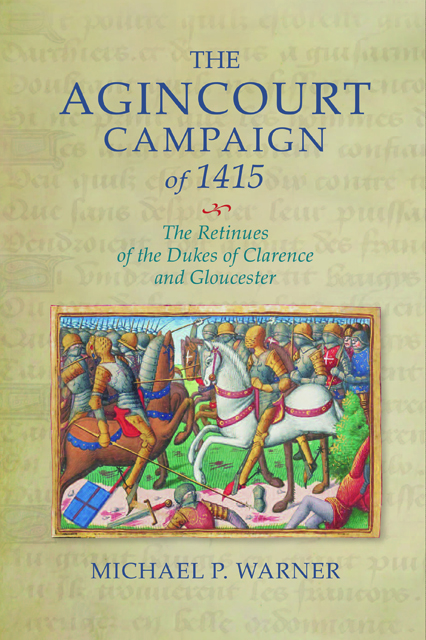Book contents
- Frontmatter
- Contents
- Lists of Tables and Charts
- List of Figures
- Acknowledgements
- Abbreviations
- Introduction
- 1 Before the Campaign
- 2 The Muster Rolls of the 1415 Expedition
- 3 Clarence’s and Gloucester’s 1415 Retinues
- 4 The Sub-Retinue Captains
- 5 During the Campaign
- 6 After the Campaign
- Conclusion
- Appendices
- Bibliography
- Index
- Warfare in History
- Frontmatter
- Contents
- Lists of Tables and Charts
- List of Figures
- Acknowledgements
- Abbreviations
- Introduction
- 1 Before the Campaign
- 2 The Muster Rolls of the 1415 Expedition
- 3 Clarence’s and Gloucester’s 1415 Retinues
- 4 The Sub-Retinue Captains
- 5 During the Campaign
- 6 After the Campaign
- Conclusion
- Appendices
- Bibliography
- Index
- Warfare in History
Summary
This project began with the aim of learning about the men who served under the dukes of Clarence and Gloucester in 1415. In the preceding chapters, we have met many of these individuals and learned about their military service histories, their careers outside the sphere of military adventure, plus where they came from, their families and familial heritage. The foundational sources have been the two complete surviving ducal muster rolls. A close examination of these rolls, alongside all the other 1415 muster rolls, plus an array of further administrative documents, has shown that the mechanics of the mustering process were complex and that there was very little standardisation. Looking to the future, a similarly close analysis of muster rolls from a wider timeframe, rather than just one campaign, would surely be beneficial. In addition to the muster rolls, a great range of additional sources have been consulted throughout: retinue rolls, issue rolls, letters of protection and attorney, post-campaign accounts, chronicle accounts and even manorial documents, to list just some. This fortunately large corpus of surviving documentation has enabled the reconstruction of the lives of many of those who served the dukes of Clarence and Gloucester in 1415. This has allowed us to follow the two strands of enquiry, outlined in the introduction, through this book. The first has related to the soldiers themselves and has included issues such as where the men came from, their careers before and after 1415, plus their personal histories; essentially, it has concentrated on the dynamics of recruitment. The second strand has focused on charting the fates of the two retinues during and after the 1415 campaign. Having followed these lines of investigation, we are now in a position to tie these threads together.
In the conclusion to his study of Arundel’s 1387 and 1388 forces, Bell considered the observation of McFarlane that a soldier ‘made no pretence of fighting for love of king or lord, still less for England or for glory, but for gain’. In slight contrast, Bell wrote ‘patriotism, ties to a regional lord, friendship and kinship and also a sense of duty as a senior member of the local community were also important to the English soldier in the Hundred Years War’, but the surviving source material allows only a minority of careers of those who ‘made their fortune’ to be reconstructed.
- Type
- Chapter
- Information
- The Agincourt Campaign of 1415The Retinues of the Dukes of Clarence and Gloucester, pp. 188 - 191Publisher: Boydell & BrewerPrint publication year: 2021

